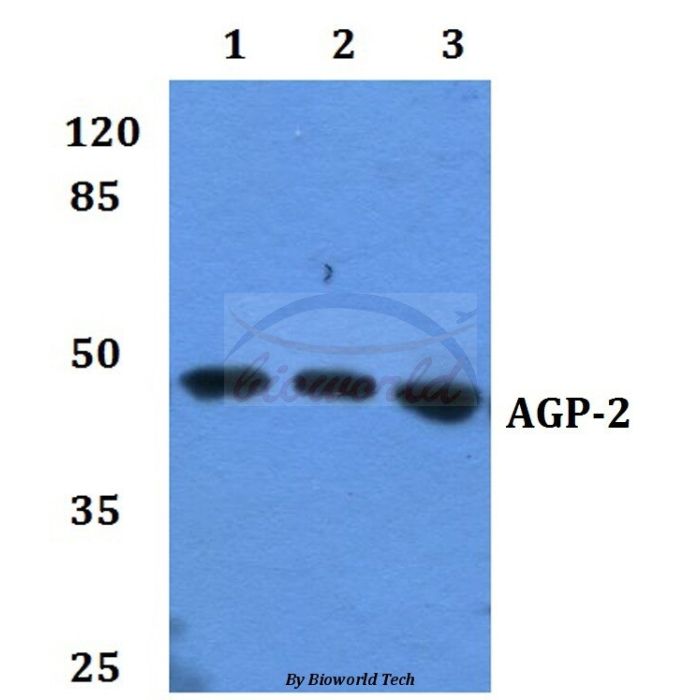AGP-2 polyclonal, anti-human, mouse, rat
€305.00
In stock
SKU
BS60097
Background:
AGP (a 1-acid Glycoprotein) is an acute phase plasma protein synthesized by the liver. It functions to regulate the interaction between blood cells and endothelial cells, and together with haptoglobin and C reactive protein, it also mediates the extravasation of cells during infection and inflammation. Expression of AGP is induced by acute-phase stimulatory agents such as bacterial lipopolysaccharides. AGP has a high affinity, low capacity binding for basic drugs at physiological pH. In human plasma, AGP is found at levels of 0.5-1.4 mg/ml, though this is elevated during acute inflammation, and, as a result, levels of this protein can be used to diagnose inflammatory conditions. Multiple AGP genes exist, including AGP-1, AGP-2, AGP-3 and AGP-8. AGP-1 and AGP-2 contain five and six potential N-glycosylation sites, respectively. Abnormal expression of the APG-1 gene is linked to sarcoidosis and other immunogenetic diseases, while mutations in the APG-2 gene are associated with different types of carcinomas.
Alternative Name:
Alpha-1-acid glycoprotein 2, AGP 2, Orosomucoid-2, Orosomucoid 2, Orosomucoid2, OMD 2, OMD2, ORM2, ORM-2, AGP2
Application Dilution: WB: 1:500~1:1000, IHC: 1:50~1:200
Specificity: AGP-2 polyclonal antibody detects endogenous levels of AGP-2 protein.
Immunogen:
A synthetic peptide corresponding to residues in Human AGP-2.
MW: ~ 24, 45 kDa
Swis Prot.: P19652
Purification & Purity:
The antibody was affinity-purified from rabbit antiserum by affinity-chromatography using epitope-specific immunogen and the purity is > 95% (by SDS-PAGE).
Format:
1 mg/ml in Phosphate buffered saline (PBS) with 0.05% sodium azide, approx. pH 7.2.
Storage:
Store at 4°C short term. Aliquot and store at -20°C long term. Avoid freeze-thaw cycles.
For research use only, not for use in diagnostic procedure.
AGP (a 1-acid Glycoprotein) is an acute phase plasma protein synthesized by the liver. It functions to regulate the interaction between blood cells and endothelial cells, and together with haptoglobin and C reactive protein, it also mediates the extravasation of cells during infection and inflammation. Expression of AGP is induced by acute-phase stimulatory agents such as bacterial lipopolysaccharides. AGP has a high affinity, low capacity binding for basic drugs at physiological pH. In human plasma, AGP is found at levels of 0.5-1.4 mg/ml, though this is elevated during acute inflammation, and, as a result, levels of this protein can be used to diagnose inflammatory conditions. Multiple AGP genes exist, including AGP-1, AGP-2, AGP-3 and AGP-8. AGP-1 and AGP-2 contain five and six potential N-glycosylation sites, respectively. Abnormal expression of the APG-1 gene is linked to sarcoidosis and other immunogenetic diseases, while mutations in the APG-2 gene are associated with different types of carcinomas.
Alternative Name:
Alpha-1-acid glycoprotein 2, AGP 2, Orosomucoid-2, Orosomucoid 2, Orosomucoid2, OMD 2, OMD2, ORM2, ORM-2, AGP2
Application Dilution: WB: 1:500~1:1000, IHC: 1:50~1:200
Specificity: AGP-2 polyclonal antibody detects endogenous levels of AGP-2 protein.
Immunogen:
A synthetic peptide corresponding to residues in Human AGP-2.
MW: ~ 24, 45 kDa
Swis Prot.: P19652
Purification & Purity:
The antibody was affinity-purified from rabbit antiserum by affinity-chromatography using epitope-specific immunogen and the purity is > 95% (by SDS-PAGE).
Format:
1 mg/ml in Phosphate buffered saline (PBS) with 0.05% sodium azide, approx. pH 7.2.
Storage:
Store at 4°C short term. Aliquot and store at -20°C long term. Avoid freeze-thaw cycles.
For research use only, not for use in diagnostic procedure.
| Is Featured? | No |
|---|
Write Your Own Review

